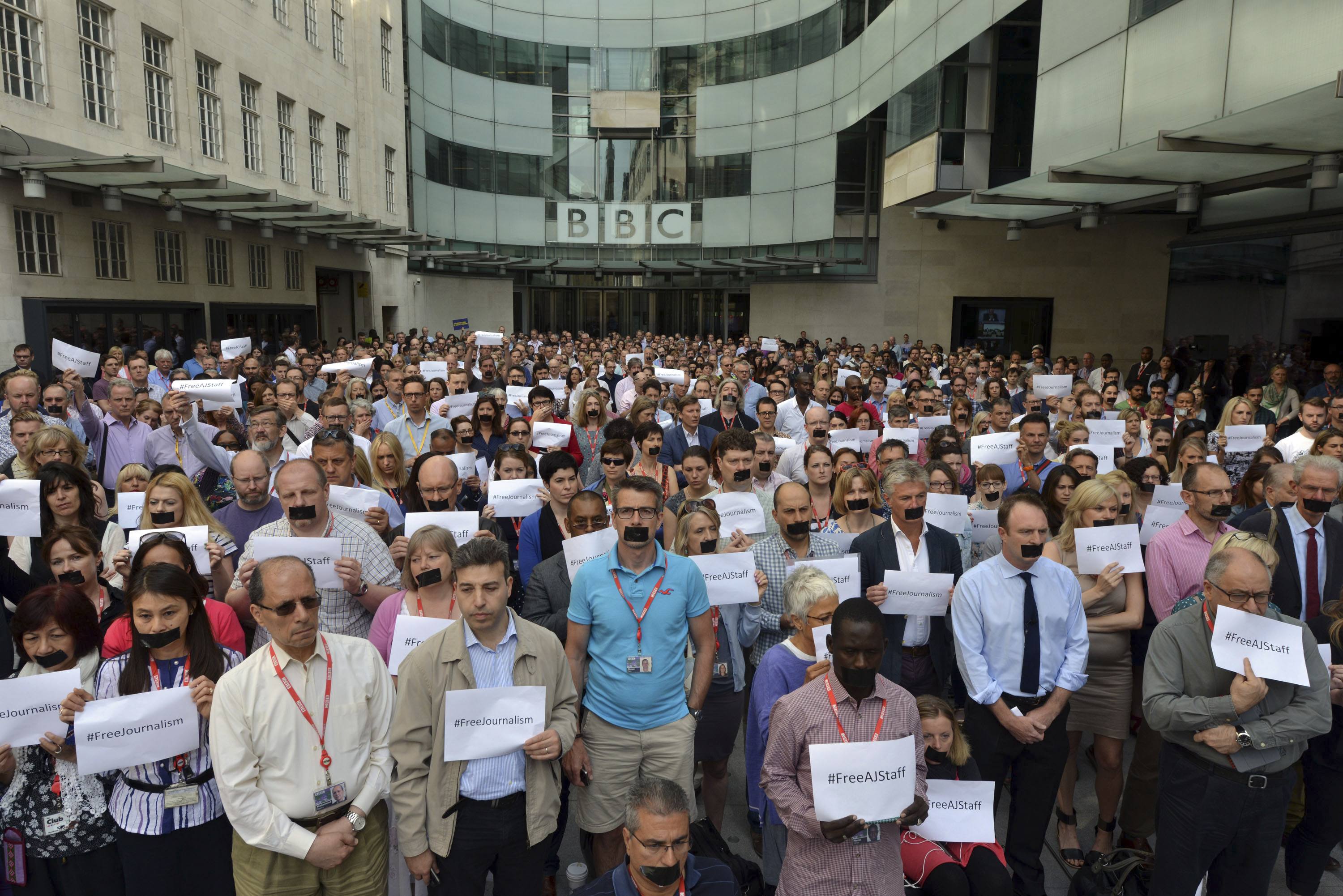Latest NEWS
- Aswat Masriya, the last word
- Roundup of Egypt's press headlines on March 15, 2017
- Roundup of Egypt's press headlines on March 14, 2017
- Former Egyptian President Hosni Mubarak to be released: lawyer
- Roundup of Egypt's press headlines on March 13, 2017
- Egypt's capital set to grow by half a million in 2017
- Egypt's wheat reserves to double with start of harvest -supply min
- Roundup of Egypt's press headlines on March 12, 2017
Egypt blocks three Iraqi TV stations from broadcasting

British Broadcasting Corporation (BBC) staff and journalists protest the imprisonment in Egypt of Al Jazeera journalists Peter Greste, Mohamed Fahmy and Baher Mohamed, by taping up their mouths outside New Broadcasting House in London, June 24, 2014 in this handout photograph released by the BBC.
CAIRO, June 24 (Reuters) - Egypt has barred three private Iraqi TV stations from its main satellite system, the broadcasting regulator said on Tuesday, after Baghdad complained that their coverage was stoking sectarian tensions.
The news came a day after Egypt jailed three Al Jazeera journalists on charges of aiding the outlawed Islamist Muslim Brotherhood organisation, a ruling condemned around the world as a blow to press freedom.
Al-Baghdadia, Al-Rafidain and Al-Hadath TV stations were all barred from the state-owned Nilesat, which broadcasts across the Middle East and North Africa, the head of Egypt's broadcasting regulator Free Zone said.
The three channels have been off the air in Iraq and Egypt since last week. They often took a pro-Sunni, anti-Iraqi government line that appeals to the country's Sunni minority, although al-Baghdadiya in particular had investigative programming that attracted a broader segment of the population.
The channels have covered the onslaught by Sunni insurgent group Islamic State in Iraq and the Levant extensively and carried statements from the al Qaeda offshoot.
An official at Free Zone, speaking on condition of anonymity, said the decision to block the channels was linked to complaints from Iraq.
The regulator's head, Abdel Moneim Al-Alfy, said: "Al-Baghdadia and Al-Rafidain channels were taken off Nilesat for violating their contracts with the Free Zone authority regarding their content." He did not directly link the decision to Iraq's complaints.
"We have received complaints from the Iraqi government about the channels' contents and are investigating them now, that is all I could say so far," Al-Alfy said.
He said Al-Hadath's permit had expired.
Al-Baghdadia confirmed it was now banned in Iraq and Egypt while Al-Hadath's CEO Ayman Khalid said his channel's closure was temporary and over a financial dispute with Free Zone. Al-Rafidain could not be reached for comment.
Egypt has shut down a number of pro-Islamist channels since the army's ouster of Islamist President Mohamed Mursi last year.
On Monday it triggered an international outcry by jailing three journalists from Qatar-backed Al Jazeera television, accusing them of aiding Egypt's outlawed Islamist Muslim Brotherhood. (Reporting by Ali Abdelaty and Yasmine Saleh in Cairo and Alexander Dziadosz in Iraq; Writing by Yasmine Saleh; Editing by Robin Pomeroy)










